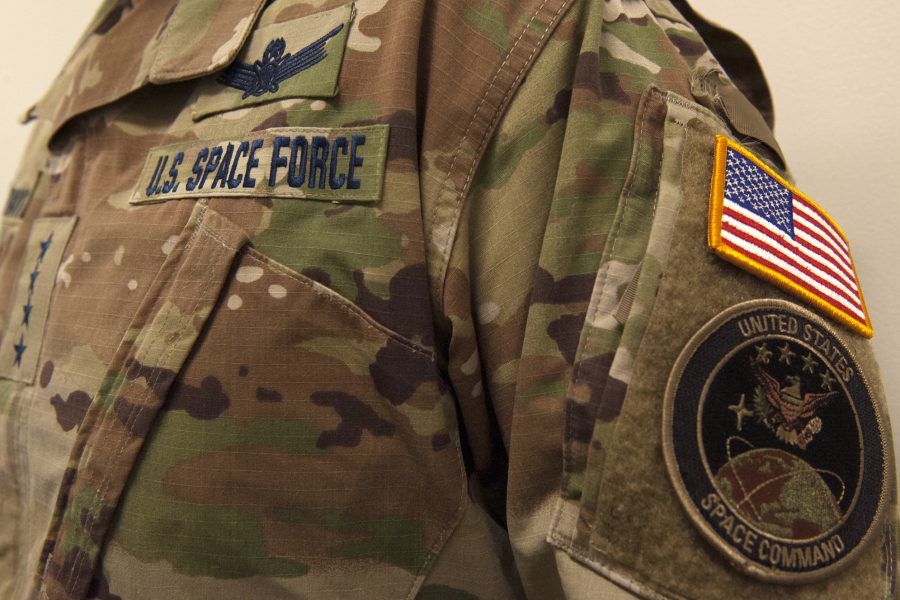The Space Force will soon start formally accepting Airmen’s applications but isn’t taking volunteers from services outside the Air Force just yet, officials clarified this week.
During the month of May, Active-duty Air Force officers as well as enlisted members in existing space careers and certain other jobs can apply to join the Space Force, USSF said in an April 22 release. That includes the 16,000 or so military and civilian employees who previously worked for Air Force Space Command and now make up the bulk of the new service, but have not yet formally transferred in.
People who are eligible to apply for the first round of transfers include those in the following fields:
- Space operations (13S)
- Space systems operations (1C6)
- Intelligence (14N)
- Cyberspace operations (17X)
- Developmental engineer (62E)
- Acquisition manager (63A)
- Operations intelligence (1N0)
- Geospatial intelligence (1N1)
- Signals intelligence (1N2)
- Fusion analyst (1N4)
- Targeting analyst (1N8)
- Cyberspace support (3D0)
- Client systems (3D1)
Airmen in the 13S and 1C6 fields will start transferring into the Space Force on Sept. 1. People with those specialty codes who opt not to join the new service will instead retrain for another USAF career, move into the Air National Guard or Air Force Reserve, or apply for separation or retirement. Those people could still be assigned duties in the Space Force while remaining as Air Force employees. At some point in 2022, the space operations career path will be available only through the Space Force.
Air Force and Space Force officials are setting up a board process, like that which exists to move service members between other branches of the armed forces, to decide who from careers other than space operations can join “based on mission needs and career sustainment,” USAF said. Those people, like intelligence analysts and acquisition managers, are slated to begin transferring to the Space Force on Feb. 1, 2021.
“The need for those is only going to be on the order of a few thousand,” Space Force Vice Commander Lt. Gen. David Thompson said during an April 23 event hosted by SpaceNews. “What we anticipate is, we may very well get more volunteers for those positions than we have the ability to accept.”
The Air Force Personnel Center will email personnel in eligible career fields May 1 with directions to apply online, and they have through May 31.
Army, Navy, and Marine Corps members and Air Force Guardsmen and Reservists have to wait their turn, however. While Chief of Space Operations Gen. Jay Raymond recently indicated he would take applicants from across the Pentagon next month, Soldiers, Sailors, and Marines won’t get that chance until next year at the earliest.
“The timeframe for Army/Navy space requirements to move to the Space Force remains in fiscal 2022-2023,” Space Force spokeswoman Lynn Kirby said April 23. “Although legal provisions exist for other services to transfer to the Space Force, the current focus is on transferring … over 6,000 [Active-duty] Airmen from the Air Force to the Space Force by mid-fiscal 2021. We understand there is excitement for Space Force across all services right now. Space Force will release further details for a limited inter-service transfer program for other sister services for fiscal 2021.”
ANG and Reserve units that perform space missions will continue supporting that work as usual while the Pentagon figures out whether and how to set up the Space Force’s reserve component.
Last month, USAF Secretary Barbara Barrett named 23 missions encompassing more than 1,800 Airmen that will be assigned to the Space Force over the next six months. Thompson indicated that those moves could occur within the next two months.
As Space Force recruitment levels off over time, Thompson said the service can afford to get picky. It wants to streamline certain hiring processes so people can onboard faster, as well as move more easily between the service and industry, while ensuring that applicants have the right skill set.
“There’s a lot of discussion of, because the numbers year-over-year are going to be relatively small, we may, in fact, talk about instituting a model like the submarine fleet has used for years … where on a case-by-case basis, individuals may be required to … accomplish an interview process before we decide to accept them,” Thompson said.
A report on human capital management in the Space Force is due to Congress in June.
